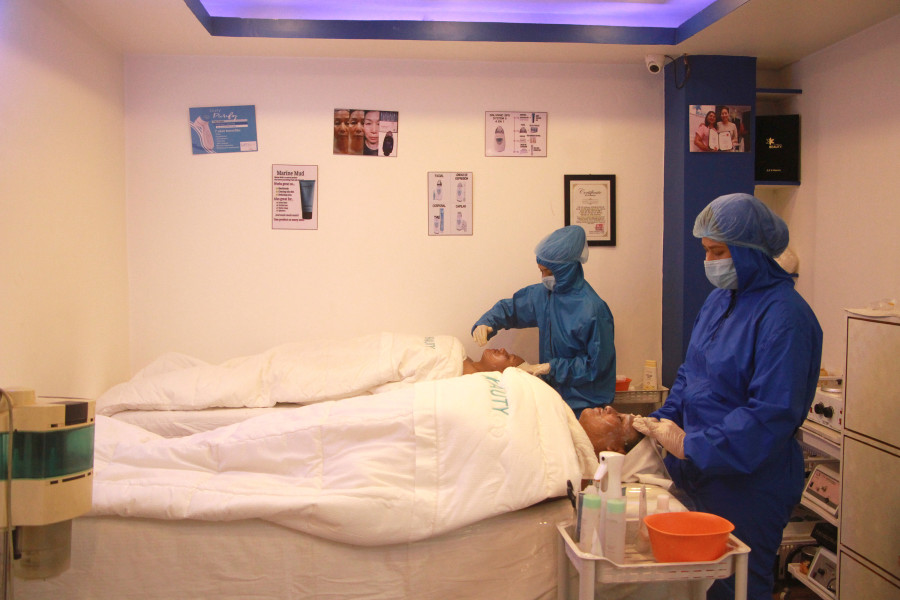Money
Beauty parlour owners fear uncertain future as strict restrictions are reimposed
They had already suffered major losses, as they were forced to shut down during the entirety of the wedding season from mid-April to mid-May.
Krishana Prasain
Sunita Nagarkoti was very excited when she opened her own beauty parlour back in mid-December. A resident of Thimi, Nagarkoti, 30, had started the venture from some money she had saved and by taking a loan from a nearby finance company.
Business was doing fairly well. Then the pandemic struck.
“Now I see no way of paying back the loan,” she said. Her husband, who used to work as a taxi driver, was also laid off and has been out of work.
She closed her parlour for three months, since the government imposed a nationwide lockdown from March 24 to curb the spread of the virus. Then, when the government eased lockdown on June 10, she reopened her parlour but business was slow; she had been getting only a client in a day.
With the way things are running, she feels it will be impossible to keep running her parlour, particularly because the interest rate of her loan keeps accumulating by the day and she has to pay rent too. “I am planning to sell the parlour so that I can pay back the loan but nobody is willing to buy. I am in trouble,” she said.
For small entrepreneurs like Nagarkoti, the pandemic has hit business hard in the past five months. And with the government re-imposing shutting down of nonessential services, like beauty parlours, business owners see more difficult times ahead.
Kamala Shrestha, president at Beautician Professional Association of Nepal, echoed the same sentiments. “Most of the beauty institutes that had just opened before the lockdown are in a state of selling their shops while already established are waiting to see how things pan out,” she said. But finding buyers in the middle of this pandemic is difficult, she added.
According to her, it takes a minimum of Rs500,000 to open a simple beauty parlour and costs go higher if it offers premium services.
Many beauty parlours had gradually started to open up when the lockdown was lifted, following health protocols, as there were not many cases in the valley, said Shrestha who is also founder and principal at Siam Institute of Hair Design and Beauty Care. But in just a month of reopening, services have again been suspended because the Valley is witnessing an increase in Covid-19 cases.
It has been a week since the government ordered such businesses to be shut. And business owners say the timing couldn't have been worse because, with Teej around the corner, this would have been a peak time for the business to make some much-needed cash, she added.
Business used to double around this time, she said.
Beauty parlours have already suffered major losses, as they were forced to shut down during the entirety of the wedding season from mid-April to mid-May. “With festivals like Teej and Dashain and Tihar, we used to do huge business. We would be booked for the wedding season in mid-November as well by now,” she said.
According to the association, there are more than 400,000 beauty professionals in the country of which 90 percent are women. Similarly, there are nearly 200,000 registered beauty institutes.
Khim Gurung, a former employee at Lakme Salon at Pulchowk, who resigned just before lockdown began, was set to join Toni and Guy in Durbarmarg. But she never got to sign her contract, because soon the lockdown began. “I have been staying at home since the lockdown was announced,” said Gurung, a resident of Naikap. She is afraid that she will forget her skills with the prolonged lockdown.
“Closing services is not the only option our government has to curb the spread. The government should set strict safety protocols and monitor businesses regularly,” she said.
The government neither provides relief packages nor allows business to operate, but daily expenses are increasing by the day, lament business owners.
Even if small businesses were to operate in the middle of the pandemic, safety measures are expensive to abide by, says Shrestha, particularly for smaller businesses.
With no viable options, Nagarkoti, who is from Sindhuli, plans to move back home once the shop gets sold and she clears all her pending payment of rents and bank loan.
“My husband has lost his job and I have lost my business. Staying here will do nothing but increase our daily expenses,” she said.




 15.96°C Kathmandu
15.96°C Kathmandu















